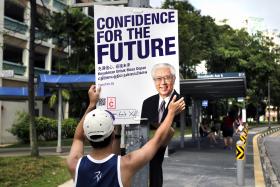Experts: Personal attacks on candidates may become norm if...
Despite calls to campaign on big-picture issues, allegations of past bad behaviour have surfaced
Even before campaigning for General Election 2015 started, political parties called for a clean fight focusing on issues, not personalities.
They argued for the speeches to be forward-looking, not about dredging up the ghosts of the past.
That utopian dream vanished even before Nomination Day on Sept 1.
An e-mail was sent to the media suggesting that an opposition candidate had been involved in an affair with a student in 2007.
The story of the allegation was published online and later edited to include the candidate's denial.
Days later, a newspaper apologised to the candidate for that report.
Once again, the call was repeated: Do not dredge up the past.
Singapore Democratic Party (SDP) chief Chee Soon Juan was more specific, saying that campaigning should steer clear of personal attacks.
In a July 27 entry on his blog, Dr Chee said of the imminent election: "In the interest of conducting a robust but positive campaign in the coming General Election, let us focus on the issues.
"My colleagues and I in the SDP promise to, in football parlance, play the ball not the man."
But the focus on the man was swift.
On Nomination Day, Ms Sim Ann, a member of the People's Action Party (PAP) team for Holland-Bukit Timah, highlighted Dr Chee's dispute with his former mentor, veteran politician Chiam See Tong, claiming that Dr Chee had kicked him out of the SDP in 1993.
Netizens, too, were not done. Videos of Mr Chiam's speech in Parliament in which he criticised Dr Chee went viral on social media.
The claims and counterclaims continued at rallies.
On the Aljunied-Hougang-Punggol East Town Council saga, both Workers' Party (WP) and the PAP have accused each other of misrepresenting the facts.
Singapore Management University law don Eugene Tan told The New Paper that while such strong words featured prominently this GE, they might ultimately not sway voters' opinions.
Said Prof Tan: "When mentioned in the heat of the hustings, people may just see it as rhetoric or grandstanding."
What could be more damaging are attacks on the candidates' personality, added Prof Tan.
ALLEGATIONS
Since the start of the election season, many members of the public have sent the media a buffet of allegations involving candidates.
There was one that detailed how one candidate had behaved like a gangster with a taxi driver.
Another raised a candidate's alleged arrest after a home intrusion. (See report right.)
Another questioned a candidate's position on gay rights and his association with a religious movement that opposed a Pink Dot event.
Said Prof Tan: "As the stakes get higher, individuals might feel tempted to resort to these tactics because they feel it might deliver a fatal blow to the candidate's electability."
Observers said when a person aspires to hold public office, he can expect to be the subject of public scrutiny. Even over past indiscretions.
National University of Singapore political scientist Reuben Wong said these methods exist because Singapore's emphasis on an office-holder's moral standing is unique in the world.
Said Prof Wong: "It has something to do with the Lee Kuan Yew legacy, in which people have a puritanical ideal of who their leaders should be. It is a strange, almost Victorian, legacy.
"People (in Singapore) wouldn't expect a CEO to quit because of his indiscretions, but they would if a political leader did it."
Prof Wong and Prof Tan warn that such "character assassinations" may become the norm in future elections because they are a proven tactic.
They pointed out the incidents in 2012 involving WP's Yaw Shin Leong and PAP's Michael Palmer.
Both were former MPs who had to vacate their seats that year due to scandals involving extramarital affairs.
Said Prof Wong: "People see that it is effective (to create a scandal), so they will continue using the tactic as long as it works... that is how politics can turn personal."
Do such strategies work?
NUS sociologist Tan Ern Ser said: "An election is a zero-sum game; hence, some people would use whatever methods available to discredit their opponents, with the hope of putting them out of action, preferably from the start."
People (in Singapore) wouldn't expect a CEO to quit because of his indiscretions, but they would if a political leader did it.
- NUS political scientist Reuben Wong
Arrest allegation made against WP's Luke Koh
When you want to occupy public office, you must not have a "dark history".
These were the words of a reader who felt a wider audience should be made aware of a candidate's history.
The reader, who spoke on the condition of anonymity, felt the public should know that Mr Luke Koh, WP candidate for Nee Soon GRC, had been arrested before in connection with an acrimonious divorce.
Marriage records show Mr Koh has been married twice.
The New Paper understands he was arrested on Sept 16, 2012, after scaling the fence at his relative's landed property. An altercation ensued and the police were called in.
Mr Koh had been attempting to gain access to his family, who were then living at the relative's home.
WARNING
He was subsequently given a police warning for criminal trespass and breaching a personal protection order (PPO), which had been taken out against him earlier.
Under current laws, vulnerable adults - including wives and parents - who are at risk of abuse by family members can apply for a PPO, a court document requiring the abuse to stop. It forbids the abuser from further harming the victim and allows the police to arrest the abuser if the abuse continues.
Mr Koh's ex-wife and relatives declined to comment when approached.
TNP asked the reader why the 2012 incident is relevant now. The reader said that Mr Goh now wants to ascend to public office.
He said: "A person who wants to hold public office cannot have that kind of history behind him."
Why not alert the WP instead of the media?
"Why should I? It is a failure on their part if they do not exercise due diligence," he said.
He said he would have alerted the media if Mr Koh had belonged to any other party, too.
When approached, Mr Koh said personal matters were out of bounds and directed all questions to the WP spokesman.
The New Paper e-mailed the party and asked: How does WP respond to the reader's charge that the party had failed to exercise due diligence?
TNP followed up with a call to the WP spokesman but the party was not able to reply by press time.
Get The New Paper on your phone with the free TNP app. Download from the Apple App Store or Google Play Store now




